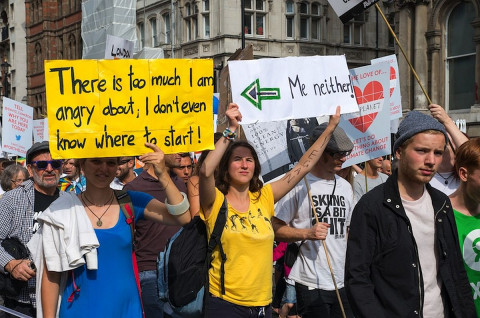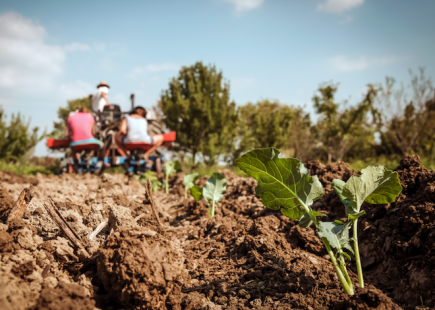Our climate reading list
Topics
All eyes will be on the climate talks in Glasgow as COP 26 unfolds. Here at the Transnational Institute we work closely with partners and allies to develop and share analysis and solutions relevant to many facets of the climate crisis. Here, in one quick article, you'll find key readings, podcasts and other resources on a wide range of climate-related issues.

Energy : Public energy is the future
Despite the pandemic, energy consumption has continued to grow and with it, demand for fossil fuels. Reading the news these days, one could easily be convinced that the transition to a sustainable, low-carbon future energy system is “already underway”. Our new report Energy transition or Energy Expanision argues that the pursuit of endless growth and capitalist accumulation has resulted in an energy expansion, rather than an energy transition. Shaun Matsheza, host of TNI's State of Power podcast spoke with Sean Sweeney, an author of the report. Sean argues that the optimism around renewable energy sources is ill-placed.
A forthcoming joint report on Public Energy Futures will be released during the COP, setting out an agenda for democratically controlled public ownership and management of the energy sector. Energy is a public good not a private commodity
On energy transition, our guide to a peoples' energy transition (also available in Spanish) presents the debates around and visions of what a popular and just energy transition should be, and how to avoid appropriation by large corporations and the fossil fuel industry.
Trade agreements
Solving the climate crisis means keeping coal, oil and gas in the ground. But the fossil fuel industry has a secret powerful weapon to keep cooking the planet: The Energy Charter Treaty (ECT). In recent years TNI and partners have carefully tracked and laid bare the ECT and its flaws. Amidst the growing backlash against the treaty, its profiteers are spewing propaganda about how the ECT attracts clean investment and how its 'modernisation' will fix any flaws. In 2020 we published a myth-busting guide to help you cut through the spin.

Climate justice not climate security
Meanwhile, the world’s biggest emitters of green house gases are spending, on average, 2.3 times as much on arming their borders as they are on climate finance. This “Global Climate Wall” aims to seal off powerful countries from migrants, rather than addressing the causes of displacement.
And as political demand for climate security as a response to the escalating impacts of climate change is growing, there is little critical analysis of what kind of security is on offer or for whom. This Primer on climate security demystifies the debate, highlighting the role of the military in causing the climate crisis, the dangers of military solutions to climate impacts, the corporate interests that profit, the impact on the most vulnerable, and alternative proposals for 'security' based on justice.

©TDL-Sandrine Mulas
Food sovereignty and land
Agroecology has gained ground in recent years as the need to transform our agrifood system becomes increasingly clear. The food and financial crises of 2008, and the worsening climate and environmental crises, have revealed deep challenges for the way we produce and consume food. Global agrarian justice and food sovereignty movements, organised in global convergences like the Nyéléni Forum, have emphasised the importance of agroecology in this transformation.
Land is a key input in economic production and production-waste sink. This links land to the causes of and responses to climate change. The dominant climate action ideas are based on the concept of ‘land tenure security’ which, in a global context marked by land-based inequities, means ratifying what already exists. This reinforces undemocratic social structures and institutions that themselves contribute to climate change. A restructuring of global land politics is called for, without which any analyses of and responses to climate change are at best superficial, and at worst, flawed and self-defeating. What is needed is to acknowledge the pervasive land-based social inequities in the world, and to end such inequities by pursuing a redistribution of a range of access to a range of land and resources in ways that categorically benefit the working people. Read more in this piece by Jenny Franco and Jun Borras.
Towards a Just Recovery from the COVID-19 Crisis examines the intersections between COVID-19 and food systems across the North African region. It looks at how the dominant ‘food security’ paradigm increased vulnerability to the economic dislocation wrought by the pandemic. It examines the impacts of COVID-19, particularly on (rural) working people and small-scale food producers and how governments across the region responded to these challenges. Finally, it offers a pathway out of this moment of crisis rooted in models of food sovereignty and economic justice.
Our Just transition workshop report shares key outcomes and insights from a workshop that took place in Amsterdam in October 2019, where participants from a range of organisations met to discuss the history of their collaborations around Just Transition and the lessons learned so far.
Paying for the pandemic and a just transition: Ten proposals could raise $9.4 trillion a year – enough to pay for the pandemic, the Sustainable Development Goals, a climate transition and reparations for slavery.
(Public) solutions
Resistance to privatisation has turned into a powerful force for change. (Re)municipalisation refers to the reclaiming of public ownership of services as well as the creation of new public services. In recent years, our research has identified more than 1,400 successful (re)municipalisation cases involving more than 2,400 cities in 58 countries around the world. The Future is Public shows that public services are more important than ever in the face of the climate catastrophe, mounting inequalities, and growing political unrest. Together, civil society organisations, trade unions, and local authorities are crafting new templates for how to expand democratic public ownership to all levels of society and opening up new routes to community-led and climate conscious public services.
Transformative Cities is an opportunity for progressive local governments, municipalist coalitions, social movements and civil society organizations to popularize and share their experiences of building solutions to our planet’s systemic economic, social, political and ecological crises. The initiative draws on the emerging wave of transformative practices and responses taking place at municipal level worldwide, by launching a unique platform and award process that will facilitate the wider dissemination of the lessons and inspiration from such practices.
Finance
TNI and CEO's latest joint report exposes how the main proposals on private finance at COP26 are based on work already done by a series of coalitions of private finance corporations. COP26: Financiers of polluters in charge unpacks the spin of Net.Zero and explains how big corporations have hijacked the decision-making table at global government level.
Change finance, not the climate is an indispensable guide for climate activists and policy-makers alike towards a complete overhaul of the financial system to stop climate chaos. Central to its message is that fossil fuel lending can be redirected towards green energy and that public finance and ownership can bankroll and provide the infrastructure for delivering a Green New Deal.
Public Finance for the Future We Want (2019): The real-world examples in this book demonstrate that a political economy that curbs the power of big finance and serves people and planet is possible. The ideas shared here are timely and urgent—a call to readiness before the next financial bubble bursts.